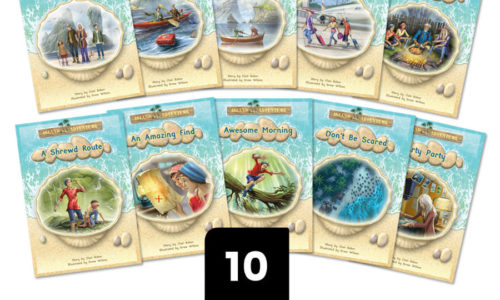I have been listening to the History of English Podcast (recommended!) and I have had a serious light bulb moment! I have just realised that the invention of the alphabet, which took place around 2000 BCE, had a huge impact on the history and culture of humankind. It was like the explosion of communication we […]
Read MoreLearning to Read
Why do older, struggling readers need age-appropriate books?

Older, struggling readers often have gaps in the their phonics knowledge and skills. They find alternative spellings particularly confusing. Many suffer from low self esteem so offering them decodable materials that are age-appropriate is vital. Vital because if the reading materiasl can engage the disaffected reader, his/her motivation to try and read will grow. Without […]
Read MoreThe reversible code
There is nothing as rewarding as seeing the grin on a young reader’s face when they have just written a word that they can read and what’s more – you can read! The discovery that the squiggles on the white board can always be read by anyone at anytime is a huge “Ah ha!” moment […]
Read MoreParent shines a light on the science of reading
It is so sad to hear when a young child says he wants to kill himself because he can’t read as described in the interview at the end of this piece. It is uplifting to hear how a parent turned this child’s life around by getting him assessed and starting him on a structured literacy […]
Read MorePhonics vs morphology: why we need both!
Some time ago, I attended a course on morphology as part of my professional development. It was presented by a dyslexia organisation. At the time, I was using an excellent phonics programme (Sounds-Write) and felt I needed to develop my understanding of morphology and its role in teaching kids to read. The presenter was very […]
Read MoreGirls can be dyslexic too
In the past, most of the students referred to the Learning Center where I work were boys. It was thought that dyslexia was a disability that mostly boys had. Girls were very good at disguising their reading disability with neat handwriting and good behavior. Sitting quietly at the back of the classroom – while failing […]
Read MoreDo decodable books need to be boring and silly?
‘Cat sat on mat….’ Critics of decodable books claim that they are boring and often don’t make sense. They quote examples like ‘Cat sat on mat. Pam sat on cat’… etc. They have a point! Many decodable books published in the past are repetitive and don’t exactly make sense. If the purpose of reading is […]
Read MoreWhy ‘structured’ reading instruction is not enough
Why we need to teach ‘structured and cumulative’ reading instruction… In the bad old days before I learnt how to teach kids to read, I taught kids to read in a structured way. That is, what I thought was structure: Week 1: letters a, b, c, d Week 2: letters e, f, g, h Week […]
Read MoreHow to make comprehension fun
Most teachers will agree that the purpose of reading is comprehension. But many children, especially kids who struggle with reading and spelling, hate comprehension activities. It’s not because they hate comprehending or answering questions. It’s because many comprehension activities often entail writing the answer. And many kids hate writing. Why? Because it’s really hard! Writing […]
Read MoreHow to help your child read a decodable book
Decodable books are books that a child can read once she/he has been taught the phonics in the book. It is really important to see decodable books as an experience that will be successful if enough preparation is made beforehand. First, do the activities that are recommended in the video below. Once your child is […]
Read More
